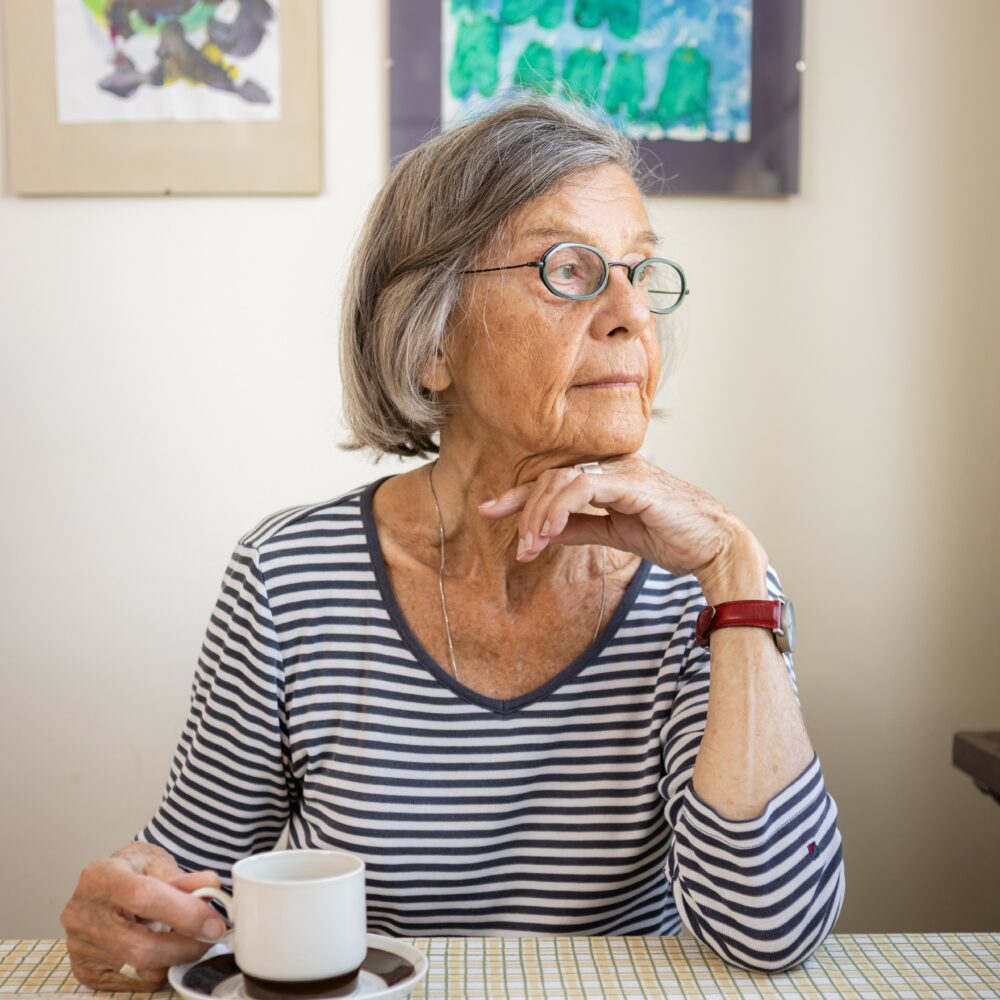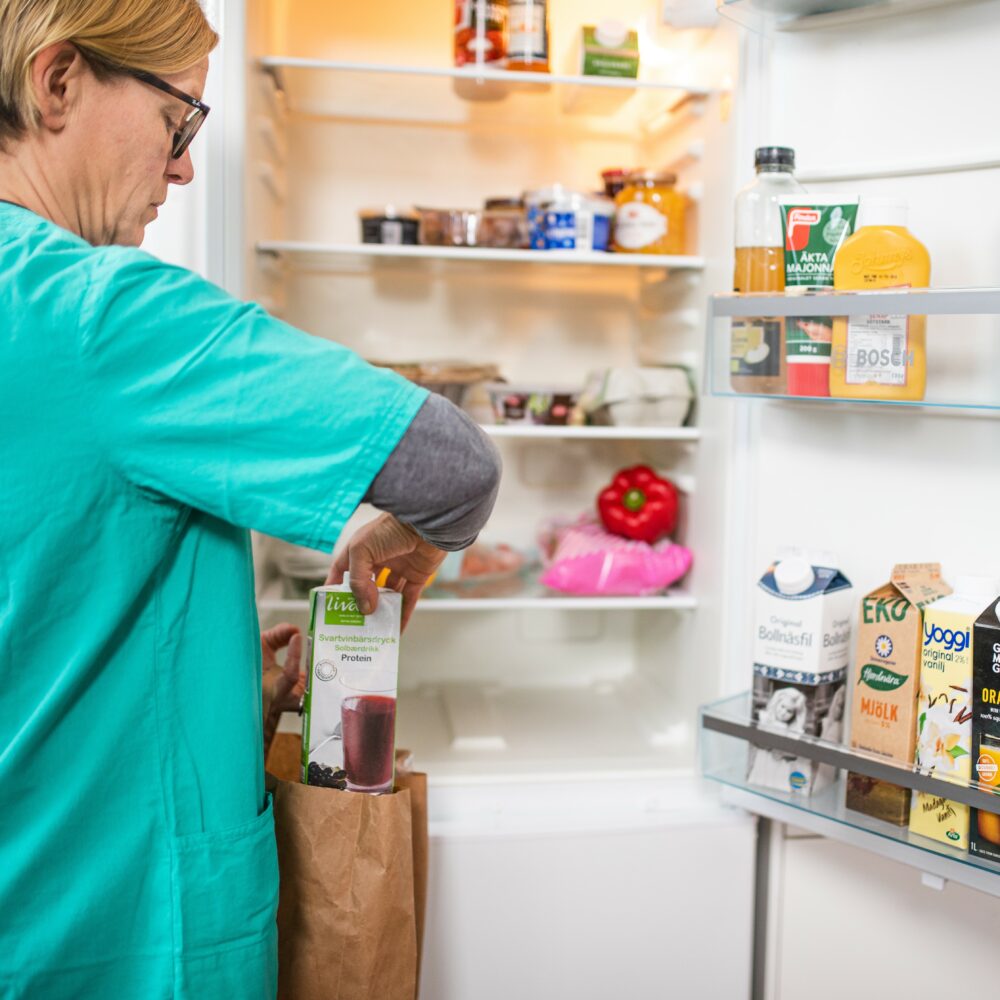Our vision is that no elderly person in Sweden should have to become malnourished by 2030
Everyone has the right to a high quality of life
Sweden’s population is getting older and a fifth will soon be over 65 years old. A frighteningly high proportion of these are malnourished or at risk of becoming so.
Malnutrition can be painful and have serious consequences for the person affected. There are studies that indicate that falls and other complications are over three times as common in malnourished people. Reduced muscle strength, lethargy, increased vulnerability to infections and a higher risk of, among other things, bedsores are examples of conditions that can affect a malnourished person. Depressed mood, delayed wound healing, impaired function of the heart and confusion are a few more.
The cost of malnutrition in health and social care amounts to around twice as much as for obesity. Every year, around a thousand people die of malnutrition and 70 000 injure themselves so seriously that they are hospitalised. Fall accidents cost society over SEK 11 billion annually. There are also studies that show that a malnourished patient costs about 10,000 more per day of care and that the number of care days increases by three to four days for malnourished people. However, the actual economic consequences of malnutrition at the societal level are missing, as the problem is spread across different stock exchanges and actors.
The problem of malnutrition among the elderly is complex. To achieve Vision Zero, we must bring about a system change driven by collaboration and with the elderly in focus.
By 2030, we want all of Sweden’s municipalities and regions, as well as relevant ministries and authorities, to work to eliminate malnutrition among the elderly.
Multi-level work to achieve the goal of Zero Vision,
we work on two levels. One involves testing solutions in a number of pilots, linked to five focus areas. The pilots are carried out in our two innovation municipalities Kävlinge and the district administration Enskede-Årsta-Vantör in Stockholm. Read more here.
The second level is about bringing about a long-term system change, where different actors in society act together for long-term solutions. To achieve this, we work with various PR activities such as meetings with politicians, debate articles and influence on policies and legislation.
We value the skills of others and welcome new learnings. Together with a strong partnership, we develop strategies and solutions to prevent malnutrition. Read more about the partnership here.
Five focus areas
We have identified five focus areas that are crucial if we are to achieve a zero vision of malnutrition in the elderly. The work with the focus areas will result in a toolbox where we gather experiences from our activities and pilots, recommendations, tips and advice.


Access to personalised food
The food only benefits if it ends up in the stomach. The challenge is to be able to offer good and nutritious food that the elderly want.
Problem
People over 65 generally have a greater need for protein in order not to become malnourished. At the same time, it is common for the hunger bell to ring less often and the appetite decreases as we age. Many older people do not get enough nutrition and energy to feel good and maintain health, which leads to less energy in everyday life and more difficult recovery after illness.
What we have done
In the autumn of 2020, our innovation municipalities, Kävlinge Municipality and the district administration Enskede-Årsta-Vantör in Stockholm conducted tests of needs-adapted food service in assisted living facilities. In the autumn of 2021, the municipalities each carried out a pilot project with needs-adapted food bags aimed at a smaller group of elderly people living at home. In Kävlinge, the elderly were offered home delivery of food for lunch, dinner and snacks, and in Enskede-Årsta-Vantör, snacks were delivered as a complement to the food service already offered with lunch and dinner. The aim was to qualitatively investigate how this meal support is perceived to affect the health of the elderly living at home.
Kävlinge municipality has also made a pilot where they offered meals from the municipality for a safer and more secure return from hospitalization. Often they have pain, temporary or permanent disabilities that affect their life situation. And they may find it difficult to do everyday things like shopping. An elderly person who comes home from hospitalization and does not know that there is food at home or doubts whether they can cook and prepare the food suffers both anxiety as well as risk of malnutrition, and malnutrition can pass very quickly when you are already fragile after a hospital stay.
2024
We continue with activities that build on previous learnings. This may involve piloting meals and snacks on prescription and further developing the collaboration with the region to offer meals upon return from hospital.
Find those at risk of malnutrition
Society often does not detect malnutrition early enough, but only when the elderly come into contact with health care or municipal care.
Problem
Malnutrition often begins in the so-called ordinary housing. More older people need to reflect on their meal situation and seek help against malnutrition if needed, but it is difficult to reach those at risk of malnutrition with information and support to prevent malnutrition.
What we have done
We have focused on three efforts to find those at risk of malnutrition:
- information material in Kävlinge
- Motivational interviewing in Enskede-Årsta-Vantör
- App to weigh and ask
Informational
In Kävlinge municipality, we have informed about the municipality’s offers and activities regarding meals and health. Unit managers, assistant nurses, coordinators, alarm installers, assistance administrators and staff at the elderly clinic at the health center were involved. The information material was distributed to all senior care recipients in a specific home care area.
App to weigh and ask
We tested an app at nursing homes in Kävlinge and Enskede-Årsta-Vantör to measure the weight of the elderly, ask about their appetite and their thoughts and wishes about meals.
Motivational interviewing
By training home care staff and assistance administrators in the method Motivational interviewing, we wanted to see if we could motivate more older people to accept meal interventions.
Motivational interviewing (MI): We found that there is a lack of training in motivational interviewing aimed at elderly care, and therefore had to develop some material ourselves, such as role play.
Mi was a good tool in the conversation with the elderly to more easily map needs during investigation and support the elderly in having a health-promoting approach.
2024
This year Kävlinge municipality will develop a ”citizen app” where elderly people will be able to make an initial risk assessment. Here, the municipality’s prevention unit should be included.
Kävlinge also continues to develop and test collaboration routines, communication channels and systematics that help municipalities and regions to collaborate to identify and support elderly people at risk of malnutrition as early as possible.
Enskede-Årsta-Vantör has hired an elderly coordinator who will create bridges between the elderly and other actors who can capture the risk of malnutrition.


Involuntary loneliness
Too many older people feel that they are involuntarily lonely. It may be because they can’t get out as easily as before, that their partner or friends have passed away. This affects both appetite and how much food you eat. Maybe you don’t think it’s fun to cook or eat yourself.
Problem
Approximately 10–15 per cent of the elderly population experience involuntary loneliness. It is a painful feeling and can be linked to physical and mental illness. That is why it is so important that we do what we can to reduce loneliness.
Social and emotional loneliness, perhaps even if their partner is alive, they feel lonely and they want to participate. You should not only have someone to talk to, but you also have to trust them, otherwise it is emotional loneliness.
What we have done
In Kävlinge municipality there is something called Mealtime Friend. This means that a volunteer and an elderly person meet once a week for a joint meal. The municipality pays for the meal friend’s food.
In our network Zero malnutrition, we have regularly held webinars on the theme of involuntary loneliness. Here are some examples:
- The International Women’s Association in Malmö (IKF) told us that it is difficult to find elderly single women because they do not participate in the public spaces. Their initiative is to identify why foreign-born women do not participate and create opportunities for them to get active.
- Sollentuna municipality wants to write out prescriptions for social activity that the health centres should be able to provide.
- The municipality also has five meeting point rooms, three activity coordinators and two health educators.
- SPF Seniorerna has developed an app where older people can seek contact with each other.
2024
In the autumn of 2023, a dialogue with elderly was started to give them a greater influence over our work. For us, it is incredibly important to put the individual at the center. The dialogues are now used as a basis for the development of our work, and we hope that they can be a voice for the prevention of malnutrition. Involuntary loneliness is one of the central issues in our dialogue.
Calculate and anchor the benefits of preventive work
Preventive measures are beneficial for identifying malnutrition in time, but also from an economic perspective
Problem
The cost of malnutrition in health and social care amounts to around twice as much as for obesity. There are studies that show that a malnourished patient costs about 10,000 more per day of care and that the number of care days increases by 3-4 if the patient is malnourished. Many municipalities are actively working to eliminate malnutrition, but the efforts are often only short-lived projects, despite good results. One reason is a lack of support in the municipality, which makes it difficult to get a hearing for continued work.
What we have done
We have begun to gather facts and evidence on what malnutrition actually costs. In Kävlinge municipality, we tested distributing meals for a whole day to the elderly in order to calculate and compare the costs of care for malnourished elderly compared to the costs of preventive measures.
Kävlinge also conducted a survey where older people answered questions related to health and quality of life. In parallel, a literature study was also conducted to obtain knowledge from previous projects in Europe, about how meal interventions contribute to increased health and quality of life.
2024
We are continuing the work that has begun, i.e. producing cost estimates for prevention and care of malnutrition. We are also working on:
- Driving public opinion so that statistics and societal costs associated with malnutrition in Sweden are produced.
- Initiating research projects to investigate how widespread malnutrition is in Sweden and what its consequences cost society.
- Investigating how cost calculations could be developed to demonstrate the benefits of preventive measures, primarily in a municipal context.


Increase knowledge about malnutrition and meals
There is a lack of general knowledge in society about how to eat with increasing age to maintain a high quality of life throughout life. Here, ageism in Sweden contributes negatively.
Problem
Food and meals are today not a fully integrated and prioritized part of health and social care, despite the fact that nutrient-dense and good food in many cases can prevent malnutrition and thus contribute to a healthier and more active life. One reason is that knowledge about malnutrition and the importance of food is generally low in important key roles around older individuals.
What we have done
We have carried out two studies. A survey was directed at staff in home care, home care and aid management, politicians and administrative staff in Kävlinge and in Enskede-Årsta-Vantör. The purpose was to find out their needs and interest in competence about food and meals for the elderly.
2024
We are working on developing different training formats together with staff in Kävlinge and in Enskede-Årsta-Vantör for both employees and managers. The formats will then be filled with content and tested. We will also see how the training can be translated into the daily work.
